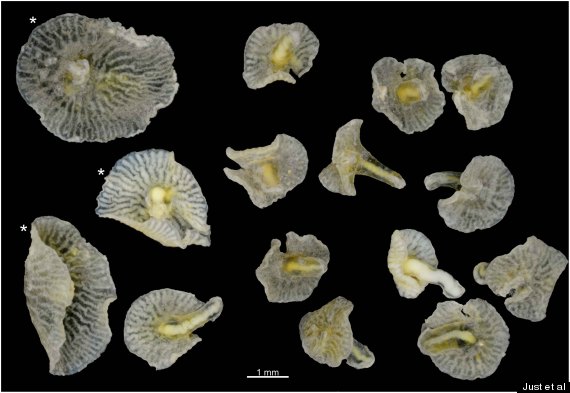In fact, the tiny, mushroom-shaped organism is so mysterious that it seems to defy just about everything we know about animals. It doesn’t fit into any of the known categories in the animal kingdom, scientists say, and as of now, its links to other animal groups remain hazy.
Recently, D. enigmatica was thrown into the spotlight when Jean Just, a zoologist at the Natural History Museum of Denmark in Copenhagen, discovered it among invertebrate specimens he had collected at depths of 400 and 1,000 meters in the Tasman Sea in the 1980s.
According to a new study co-authored by Just and published Wednesday in the journal PLOS ONE, more than a dozen of the specimens were found to defy classification in the tree of life. They were unique.
“Finding something like this is extremely rare, it’s maybe only happened about four times in the last 100 years,” study co-author Jorgen Olesen, an associate professor at the University of Copenhagen, told the BBC.
Just and his colleagues have since classified the mysterious organisms as two new species — enigmatica and discoides — under a new genus, Dendrogramma. The multicellular creatures may be related to either jellyfish or comb jelly, or they may be an intermediate between two animal groups. Or — who knows?
“We think [these organisms belong] in the animal kingdom somewhere; the question is where,” Olesen told the BBC.
Adding to the enigma, researchers said Dendrogramma may be related to a group of organisms that were believed to be long extinct. The creatures are said to bear a striking resemblance to a group of jellyfish-like creatures called “medusoids” that lived during the Ediacaran Period between 635 million and 540 million years ago.
“This discovery implies an exciting possibility that the deep-sea of Australia has preserved living descendants of the Ediacara organisms, which were thought to be extinct over 500 million years ago,” Tetyana Nosenko, an evolutionary biologist in Germany who was not involved with the study, told Nature.com.
If it turns out that the creatures are indeed related to these early animals, some suggest it might upend our understanding of evolution.
“[This could] completely reshape the tree of life, and even our understanding of how animals evolved, how neurosystems evolved, how different tissues evolved,” Leonid Moroz, a University of Florida neurobiologist who was not involved in the recent study, told National Geographic. “It can rewrite whole textbooks in zoology.”
